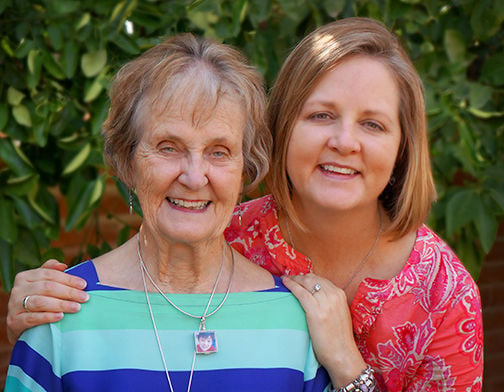I woke up New Year’s Day to a phone message from my dad.
My 83-year-old mom had fallen and broken her pelvis.
When I called her at Northwest Hospital, she was upbeat and optimistic. She didn’t need surgery and she would probably be released the following day, about the time my family was flying home from California.
“Make sure they know how healthy you are,” I told her. “Tell them you walk eight miles a day in Tucson Mall.”
We chatted. We laughed.
I was not a bit worried.
When I called later that day and again that evening, she didn’t answer. The following morning, before we boarded the plane to come home, she didn’t answer. Late that night, after our Phoenix-Tucson flight was canceled and we rented a car to get home, she finally answered.
She didn’t know where she was or why she was there. She said the nurses were trying to kill her.
That’s when I started to worry.
When I got to the hospital the following morning, I hardly recognized the woman in the hospital bed. She was confused and agitated and looked so tiny. When a nurse asked for her birth date, she couldn’t come up with it. She struggled to name the year — she finally tossed out 2010 — and she mixed up the name of our president, whom she can’t stand, with the name of our family doctor, whom she adores.
“She does not have dementia,” I kept insisting to the nurses. “This woman is sharp as a tack.”
And then my mom’s excellent health started spiraling downward. She has a contagious infection we can’t quite identify, one doctor told me. We have discovered a heart problem, another told me.
With each new problem, the date of her release slid further away. And so did my mom. Although I never voiced it at the time, I started to fear that she might not make it out of the hospital. My dad later told me that he felt the same way.
Desperate, I started Googling words like “sudden dementia” and found a few mentions of something I hadn’t heard of but immediately suspected was the problem: hospital delirium.
My mom has macular degeneration, so being in a dark hospital room, she lost sense of what time of day it was — and even what day it was. That can contribute to hospital delirium. She had suffered an extremely painful injury, which can be a contributing factor. And she doesn’t handle strong medications well, so the narcotic painkillers she was on may have been to blame.
From what I read, the best cure for hospital delirium is to get the patient out of the hospital, so that became our goal. My sister-in-law, whose own mother was hospitalized that week, worked tirelessly to get my mom out of bed and off the catheter. We asked the doctors to find an alternative to the narcotic pain medications. We pushed hard to get her moved to in-patient rehab.
Finally, after eight days, she moved to HealthSouth Rehabilitation Institute of Tucson. The admitting nurse got my mom to say her name, but she couldn’t get any other information out of her — even the reason she was hospitalized.
I was scared she wouldn’t be able to stay since patients there must be able to participate in their own treatment.
I went home shaking. But the next morning, the fog started to lift. At lunch, we had something that approached a normal conversation. By that night, just 24 hours after leaving the hospital, she was back.
She started riding a stationary bike, walking in the swimming pool and doing occupational therapy. She was discharged 10 days later and ditched the wheelchair, then the walker, and now is back to walking in the mall.
Had I known then what I know now, I would have insisted that a friend or family member stay with her constantly in the hospital to remind her again and again of where she was and why she was there.
I would have immediately sought alternatives to narcotic pain medications. I would have brought in a bright, adjustable light to simulate the time of day.
Or better yet, I would have tried to bring her home and arrange for care there. She didn’t need surgery. She didn’t have an open wound. Looking back, I’m not convinced that admitting her was the best choice.
Almost no one I know has heard of delirium, but it affects an estimated 7 million hospital patients each year.
I hope that by sharing our stories we can raise awareness and help people avoid something that is truly terrifying and far easier to prevent than to treat.





